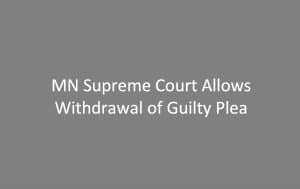MN Supreme Court Allows Withdrawal of Guilty Plea on Felony Murder
Recently, to “correct a manifest injustice”, the Minnesota Supreme Court allowed a withdrawal of a guilty on a felony murder case. How can that be, you say? Withdraw, take back, your guilty plea? Here, the record made in court when the defendant plead guilty did not establish the necessary facts for felony murder.
In Minnesota, felony murder occurs when someone causes the death of another with the intent to do so while committing or attempting to commit various felonies, such as burglary, aggravated robbery, kidnapping, arson, drive-by-shooting, etc. The punishment is life in prison with the possibility of parole after thirty years. If someone pleads guilty to felony murder, then they need to provide an adequate factual basis for the record. That is, say they intended to kill someone while committing one of the requisite felonies.
In this case, the defendant did not admit to adequate facts to find him guilty of murder while committing an aggravated robbery. The key facts in dispute were “while committing aggravated robbery.” The record showed the aggravated robbery occurred in Hibbing and the murder on the Mesabi Trail. The court reasoned that “[i]f anything, the fact that two events happened in two distinct places suggests that the killing did not occur while Bonnell was committing aggravated robbery.” The court further explained that it has “never affirmed a felony murder conviction when the aggravated robbery is the predicate offense and the aggravated robbery and the killing occurred in distinct locations.” The prosecution argued that the defendant and his accomplices transported the victim from Hibbing to the Mesabi Trail, but the supreme court said it did not prove that the killing occurred while the victim was being robbed. The court reasoned that it does not need a precise time the two acts occurred as it has upheld a prior felony murder case when there was a time range provided.
The Minnesota Rules of Criminal Procedure provide that to be valid, a guilty plea must be accurate, voluntary, and intelligent. In this case, the Minnesota Supreme Court reversed because it stated the factual basis for the plea was not accurate. The court remanded the case to the district court where the defendant can now have a trial on his pending charges. It will be interesting to see if another plea deal is struck, even though agreeing to a life sentence is not much of a plea deal, or if the case actually concludes with a trial. I am guessing it will be the latter. Often, defendants regret pleading guilty when they are sitting in prison. They will try any avenue to get their cases opened up and take another crack at staying out of the clink. Here, because of an inadequate factual basis, the defendant will get another shot.
To make sure your constitutional rights are being protected, and for case review at no charge, contact us by phone or text at: 612-547-3199. You can also reach us by email at: ambroselegal@icloud.com.
Robert H. Ambrose is a criminal defense lawyer and DWI attorney in Minnesota. Super Lawyers named him Super Lawyer this year and a Rising Star the previous six years. He is an adjunct professor at the University of Minnesota Law School. DWI Attorney Woodbury MN, Criminal Defense Lawyer Minneapolis MN, Criminal Appeals Lawyer Minnesota.


No comments:
Post a Comment